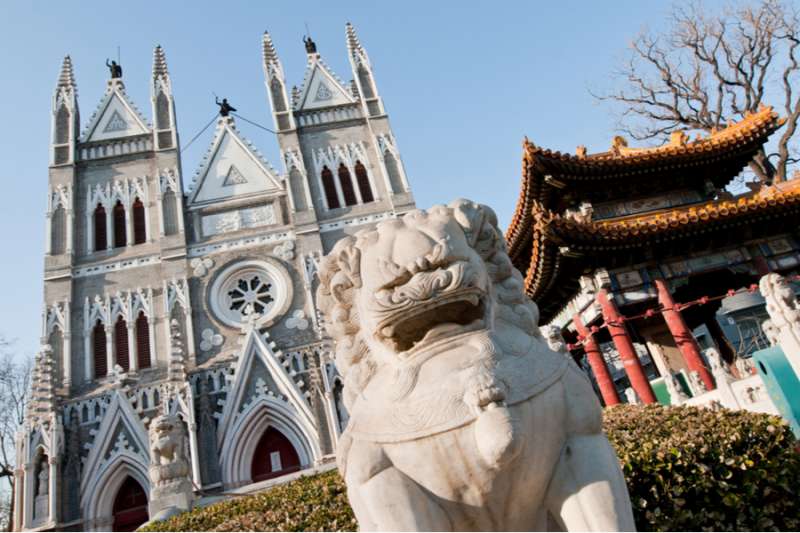At a congressional hearing on the worldwide persecution of Christians, religious freedom advocates warned Thursday of the plight of Christians in Asia and particularly in China, where the government is acting forcibly bring religion under Communist Party control.
“I have been in Congress since 1981, I have worked on human rights in China since 1981,” Rep. Chris Smith (R-NJ), co-chair of the Tom Lantos Human Rights Commission, told the commission’s hearing on June 27.
Referring to China’s campaign to “sinicize” religion, Smith said it was proceeding with brutal efficiency. “Under ‘sinicization,’ all religions and believers must comport with and aggressively promote communist ideology -- or else,” Smith said.
“It’s never been worse than it is right now.”
“Religious believers of every persuasion are harassed, arrested, jailed, or tortured. Only the compliant are left relatively unscathed. Bibles are burned, churches are destroyed, crosses set ablaze atop church steeples,” Smith said.
In addition to the mass internment of Uyghur Muslims in what are effectively “concentration camps” that “are up and running to commit genocide,” Smith said that the government has instituted requirements for facial-recognition cameras, restricted religious expression online, and people under age 18 have been prohibited from attending religious services. Officials have also engaged in campaigns to rewrite the Bible.
Thursday’s hearing focused on “Violations of the International Right to Freedom of Religion” of Christians. Sam Brownback, the State Department’s Ambassador-at-Large for International Religious Freedom, also testified, along with the Vice Chair of the U.S. Commission on International Religious Freedom and others.
Christians are the most widely persecuted religious group in the world, facing violence and harassment in 144 countries, Brownback told the Commission, citing a recent Pew study.
“Religious persecution is a defining challenge of the 21st century, and the United States will proudly lead the charge to protect religious freedom wherever it is under attack,” Ambassador Brownback stated on Thursday.
In his testimony before the Commission, Brownback pointed to the Middle East where “Christian communities are dwindling due to harsh persecution, unjust imprisonments and religiously motivated violence,” including in Iran where Christians are are in jail facing charges brought by the Iran Revolutionary Court of “enmity against God,” “corruption on Earth,” and “disturbing national security.”
Dr. David Curry, President of the group Open Doors USA, which monitors Christian persecution and advocates for religious freedom, stated that according to the group’s most recent “World Watch List,” 4,146 Christians were killed for their faith in 2018, along with 2,625 detained without trial, arrested, sentenced and imprisoned. Over 1,266 churches were attacked in 2018.
Curry also noted a “dramatic rise” in violence against Christians, which he attributed to several causes, including radical Islamic jihadist ideology, a surge in religious nationalism in countries like India, and the rise of communist or post-communist political systems.
The Easter bombings of churches and hotels in Sri Lanka that killed over 250 people were also a topic of discussion at the hearing.
Rep. Ilhan Omar (D-MN) relayed concerns from Christians in Sri Lanka of the government shutting down churches for “security” purposes in the wake of the bombings. Some members of the military guarding the churches also tortured Catholics in the country’s recent civil war, she said, adding that “many” Christians there “are understandably nervous about the Sri Lankan government’s intentions.”
Brownback answered that the State Department has been pushing for the government to uphold the rights of religious minorities while maintaining security.
There are “deep wounds within the society that need to be addressed,” Brownback said. “There needs to be some major reconciliation.” He praised Cardinal Malcolm Ranjith for an “outstanding job” in calling for no retribution for the Easter attacks.
In addition, Brownback noted that a result of last year’s Ministerial to Advance Religious Freedom, hosted by the State Department, was the creation of a fund for victims of religious violence, and that fund had been made availibe to victims of the Sri Lanka bombings.
Nadine Maenza, Vice Chair of the U.S. Commission on International Religious Freedom, noted that in Pakistan, “state security forces in last year have disappeared dozens of young Christian” in the city of Karachi. Although many have been released, Christians are fearful of an escalation, she said.
In Burma, although the plight of the Rohingya Muslims has garnered international attention, “less known is the plight of the Christians,” she said.
Due to conflict between the country’s military and ethnic armed organizations, thousands of Christians have been displaced, and the government has used the conflict as a pretext to crack down on Christian leaders, “accusing them of working with ethnic armed organizations.”
“The Burmese government has created a culture of fear and violence for Christians that fundamentally undermines their ability to practice their faith,” she said, calling for U.S. sanctions on Burmese Senior General Min Aung Hlaing “for his direct role in perpetrating atrocities against Rohingya and ethnic minorities in Burma including Christians and Rohingya Muslims.”

